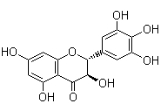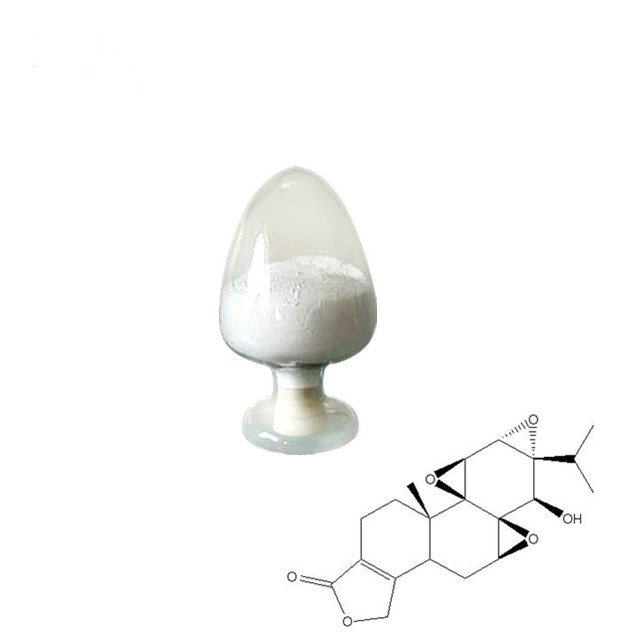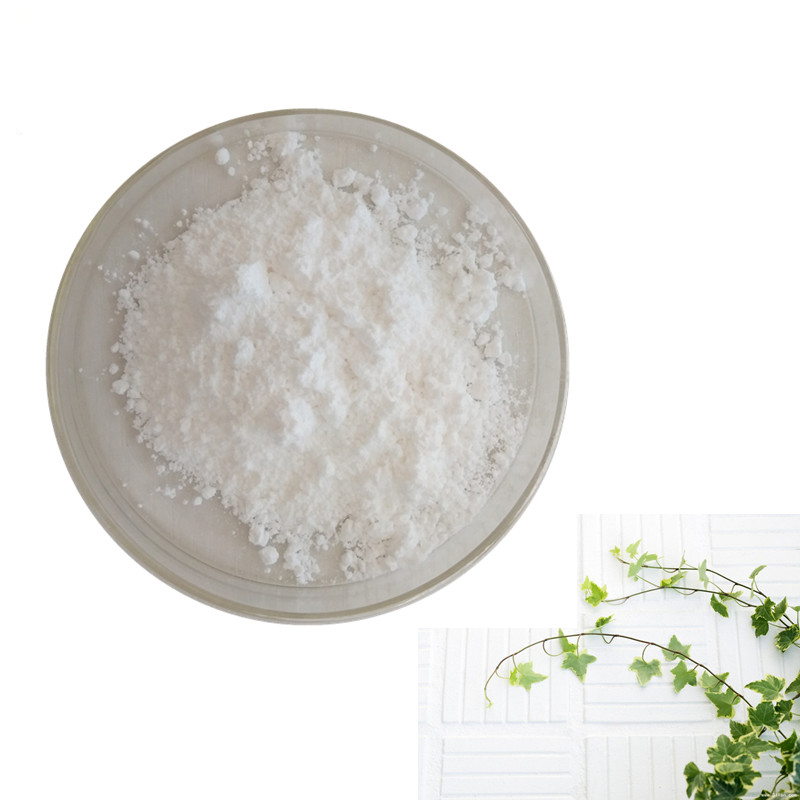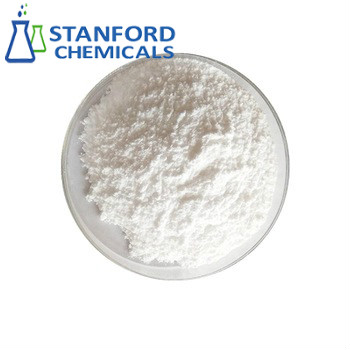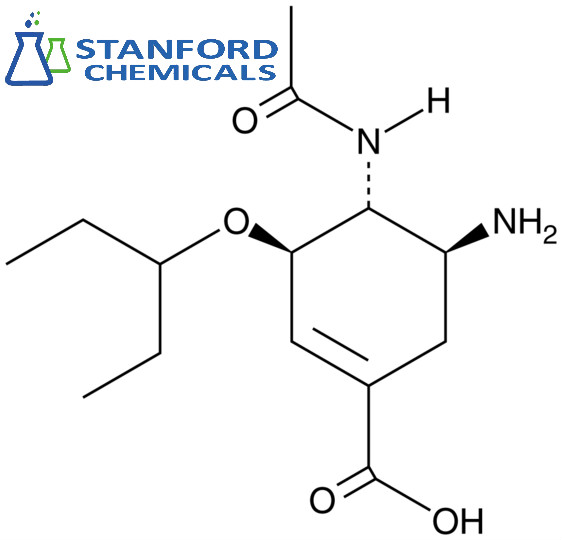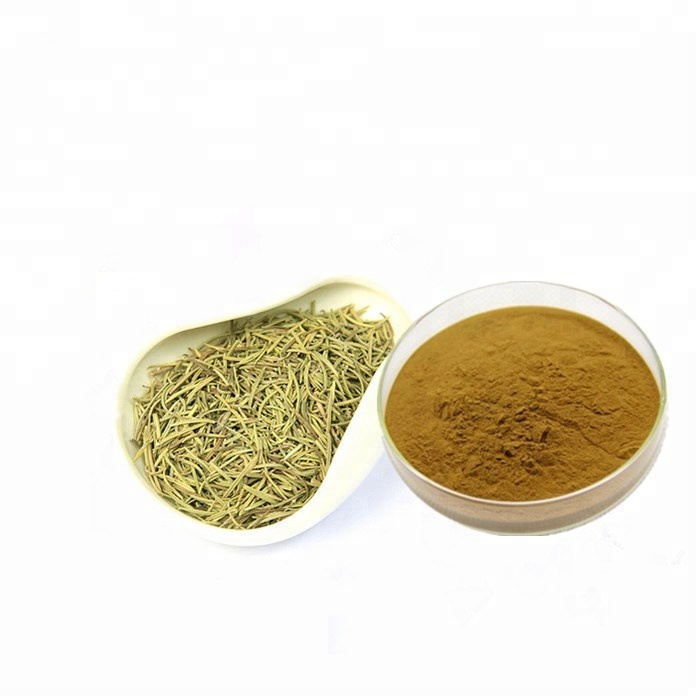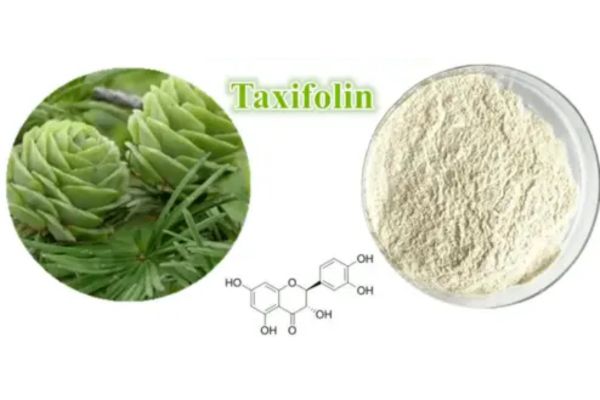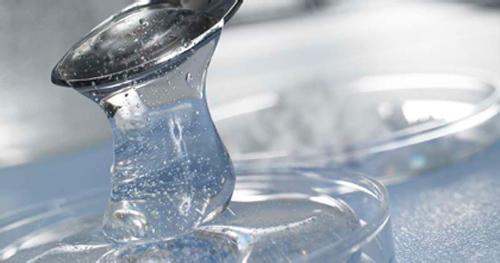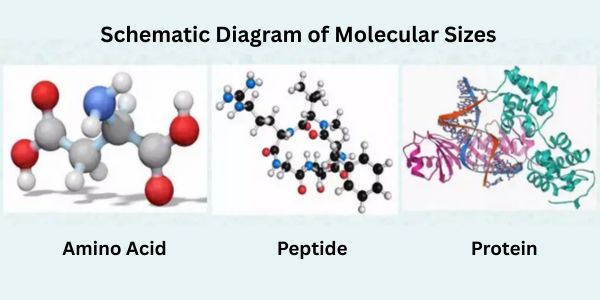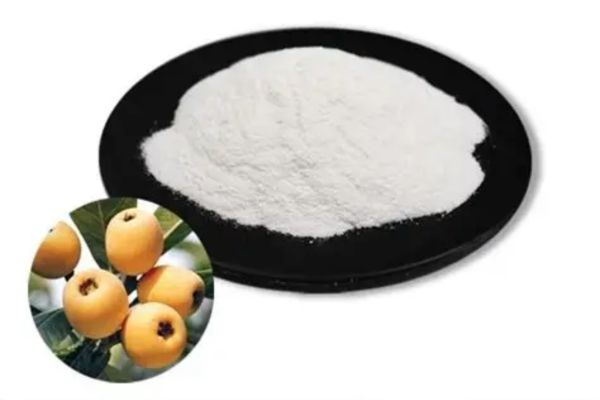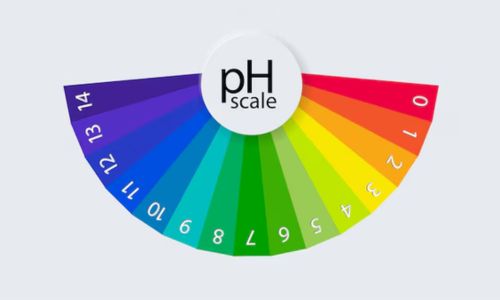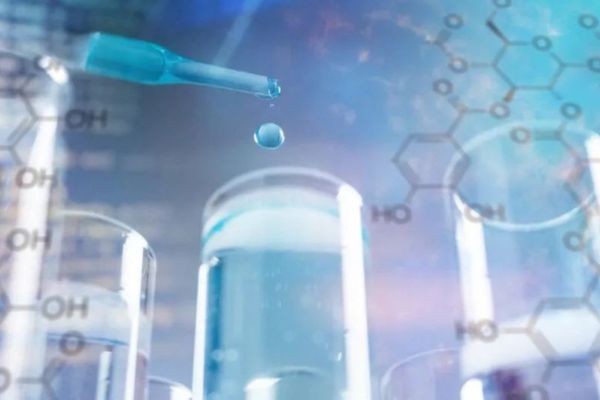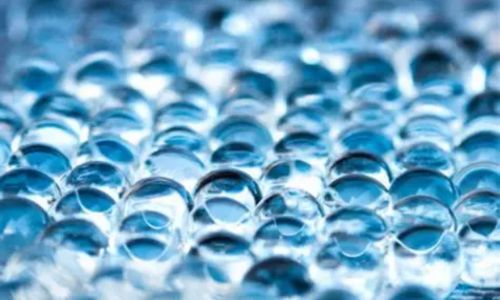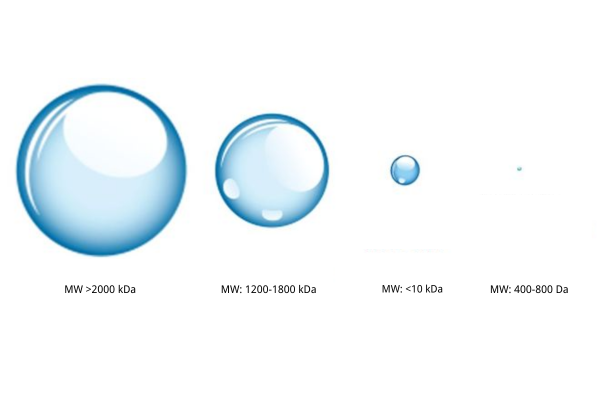Apigenin has six major pharmacological effects: anti-tumor, cardiovascular protection, anti-neurodegenerative diseases, anti-type 2 diabetes, antioxidant, and calming effects. 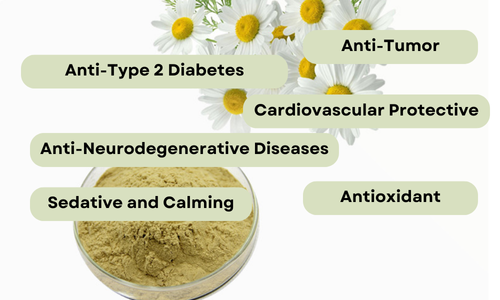
Fig 1. Benefits of apigenin
What is Apigenin?
Apigenin, also known as parsley flavonoid, is a natural flavonoid compound. It is widely found in various vegetables and fruits in nature, such as celery, garlic, broccoli, onions, apples, oranges, and more, with the highest content found in celery. For centuries, some plants containing apigenin have been used as ingredients in traditional Chinese medicine to treat diseases such as neuralgia, Parkinson's disease, and asthma.
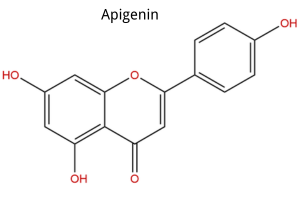
Fig 2. parsley flavonoid structure
A Natural Cancer Fighter
Research has shown that apigenin has multiple mechanisms of anti-tumor effects and is quite effective.
--Mechanisms of Action:
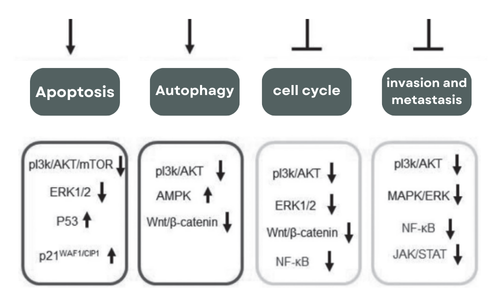
Fig 3. Anti-tumor mechanism of parsley flavonoid
One of the fundamental biological characteristics of tumors is uncontrolled proliferation, which is based on the dysregulation of cell cycle control.
Apigenin can inhibit the proliferation of tumor cells by regulating the cell cycle. Parsley flavonoid can induce apoptosis by inhibiting the PI3K/AKT/mTOR pathway. Studies have shown that it can induce autophagic cell death by increasing the production of reactive oxygen species (ROS), leading to DNA damage.
Inhibiting the invasion and metastasis of tumor cells is crucial for tumor treatment, which is also an important mechanism of apigenin's anti-tumor effects. For example, parsley flavonoid can inhibit the invasion and metastasis of lung cancer cells by regulating the PI3K/AKT signaling pathway. Angiogenesis is an important process in tumor proliferation.
Parsley flavonoid inhibits tumor angiogenesis, thereby depriving tumors of blood, oxygen, and nutrients necessary for survival, which is significant for its anti-tumor properties.
--Clinical Applications:
- Breast Cancer: Studies have shown that apigenin can inhibit the proliferation and promote the apoptosis of breast cancer cells.
- Colon Cancer: It effectively inhibits the growth of colon cancer cells by modulating the Wnt/β-catenin signaling pathway.
- Prostate Cancer: In prostate cancer, it can inhibit the expression of androgen receptors, thereby reducing the proliferation of cancer cells.
The Cardiovascular Protective Power of Apigenin
Apigenin has protective effects on the cardiovascular system, primarily through anti-inflammatory, antioxidant, lipid metabolism improvement, and inhibition of platelet aggregation. It can reduce the oxidation of low-density lipoprotein (LDL), preventing atherosclerosis.
--Mechanisms of Action:
- Antioxidant: Apigenin can increase the activity of endogenous antioxidant enzymes such as SOD and CAT, reducing oxidative stress.
- Anti-inflammatory Effects: By inhibiting the NF-κB and MAPK signaling pathways, parsley flavonoid reduces the release of inflammatory mediators (e.g., TNF-α and IL-6).
- Improvement of Lipid Metabolism: It can lower plasma cholesterol and triglyceride levels while increasing high-density lipoprotein (HDL) levels.
- Inhibition of Platelet Aggregation: It can inhibit the synthesis of TXA2 (thromboxane A2), thereby reducing platelet aggregation and thrombosis.
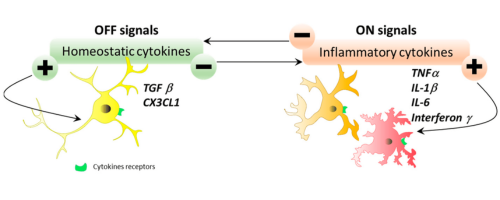
Fig 4. “Homeostatic cytokine” “inflammatory cytokine” signals.
--Practical Applications:
- Atherosclerosis: Apigenin can reduce the risk of atherosclerosis by inhibiting endothelial inflammation and oxidative stress.
- Hypertension: It has vasodilatory effects and stabilizes blood pressure, making it useful as an adjunct in managing hypertension.
- Myocardial Ischemia Protection: In ischemia-reperfusion injury, it improves cardiac function by reducing myocardial apoptosis and oxidative damage.
Natural Savior for Neurodegenerative Diseases
Studies have shown that parsley flavonoid can play a significant role in neurodegenerative diseases through various biological mechanisms. Its effects on Alzheimer's disease (AD) and Parkinson's disease (PD) have attracted increasing attention.
--Role of Apigenin in Alzheimer's Disease
Alzheimer's disease is a neurodegenerative disorder characterized by a gradual decline in cognitive function, primarily caused by the deposition of β-amyloid protein (Aβ) and neurofibrillary tangles. Apigenin has a significant effect on inhibiting Aβ production and promoting its clearance. It reduces Aβ deposition in the brain by inhibiting the activity of β-secretase (BACE1), thereby lowering the risk of Aβ accumulation. Additionally, it enhances the phagocytic function of macrophages and microglia in the brain, accelerating Aβ clearance and further reducing its accumulation. Apigenin can also improve synaptic function and cognitive ability. It promotes the expression of brain-derived neurotrophic factor (BDNF), enhances synaptic plasticity, and thus improves learning and memory abilities.
--Role of Apigenin in Parkinson's Disease
Parkinson's disease is a neurodegenerative disorder characterized primarily by motor dysfunction, mainly due to the loss of dopaminergic neurons in the midbrain and the formation of Lewy bodies from α-synuclein aggregation. Apigenin has a protective effect on dopaminergic neurons. It provides antioxidant protection and reduces neuronal damage by reducing oxidative stress and lowering ROS production. Additionally, the parsley flavonoid can alleviate neuroinflammation in Parkinson's disease.
Natural Solutions for Anti-Type 2 Diabetes
Type 2 diabetes is a metabolic disease characterized by insulin resistance and hyperglycemia. Apigenin has shown significant effects on improving glucose metabolism, enhancing insulin sensitivity, and protecting pancreatic β-cells. The parsley flavonoid can activate the AMPK (adenosine monophosphate-activated protein kinase) pathway, thereby enhancing glucose uptake and utilization by cells and improving overall insulin sensitivity. Furthermore, it reduces liver glucose output by downregulating the expression of gluconeogenesis-related enzymes (such as PEPCK and G6Pase), helping to control blood sugar levels. Apigenin also can protect pancreatic β-cells. It reduces oxidative and inflammatory damage to β-cells, maintaining their function and survival, which is significant in slowing the progression of type 2 diabetes and the occurrence of complications.
A Powerful Natural Antioxidant for Health
Apigenin is a potent natural antioxidant that can effectively scavenge free radicals and reduce oxidative stress on cells. By removing reactive oxygen species (ROS) and reactive nitrogen species (RNS), it reduces oxidative damage to cell membranes, proteins, and DNA. This antioxidant capacity helps protect various tissues and organs in the body, slow down aging, and reduce the risk of diseases. The antioxidant effects of apigenin are applied in multiple fields. In cosmetics, apigenin is used as an antioxidant ingredient to reduce skin damage and inflammatory responses caused by UV rays, preventing skin photoaging. In food and nutrition, it is used to slow down aging and improve overall health. Additionally, it is used to protect the cardiovascular system and liver, alleviating oxidative stress and tissue damage caused by drugs or environmental toxins.
Nature’s Answer to Stress and Anxiety Relief
Apigenin has sedative and anti-anxiety effects, primarily achieved by regulating neurotransmitter balance and reducing neuroinflammation. It also can enhance the activity of GABA (γ-aminobutyric acid) receptors, increasing the inhibitory effect of the central nervous system, resulting in calming and relaxation effects. This helps alleviate anxiety, reduce stress, and improve sleep quality. Additionally, apigenin regulates neurotransmitter levels such as 5-HT (5-hydroxytryptamine) and dopamine, improving mood and cognitive function.
Apigenin can be used as a natural substance for adjunctive therapy of anxiety disorders, insomnia, and stress management. In animal studies, this extract has been shown to reduce anxiety behaviors and improve emotional stability significantly. In sleep research, it has demonstrated a sleep-promoting effect, extending sleep duration and improving sleep quality.
Safety of Apigenin
Apigenin is primarily sourced from common foods and has been consumed by humans for a long time, generally considered safe. Animal and in vitro studies also indicate that it has low toxicity at regular doses. In human clinical studies, apigenin supplements have generally not shown significant side effects at reasonable doses. However, given the individual differences, some people may be allergic to apigenin or its metabolites.
FAQs About the Side Effects:
- Can apigenin cause diarrhea?
There’s limited evidence specifically linking apigenin to diarrhea. However, high doses of any supplement or herbal extract might cause gastrointestinal issues, including diarrhea. If you experience gastrointestinal discomfort, it could be due to the apigenin supplement or other ingredients in the product.
- Can apigenin cause headaches?
Headaches are not commonly reported as a side effect of apigenin. However, if you’re sensitive to supplements or taking them in combination with other substances, you might experience headaches. It's essential to monitor how you feel and consult with a healthcare provider if you have persistent headaches.
- Can apigenin cause insomnia?
Apigenin is often noted for its potential calming effects and is sometimes used to help with sleep and anxiety. It is unlikely to cause insomnia. In fact, it may help with sleep in some individuals. If you experience insomnia after taking, it might be worth looking into other factors that could be affecting your sleep, such as other medications or stress.
Prospects
As a naturally occurring flavonoid compound, apigenin has good biological safety and high medicinal value. Parsley flavonoid can potentially improve inflammation, cardiovascular disease, neurodegenerative diseases, tumors, and diabetes through multiple targets and pathways, and its teratogenic toxicity is relatively lower compared to other flavonoid compounds.
Stanford Chemical Company (SCC) is a premium supplier of hyaluronic acid and herbal extracts. We provide our customers with apigenin extracts with a purity of 98%. For more information or specific applications, please visit our home page.
Related reading: Top 5 Powerful Benefits of Dihydromyricetin in Health Top 10 Benefits of Hyaluronic Acid


